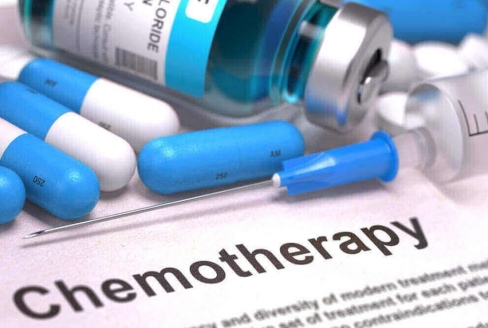Improving Chemotherapy Treatment for Mesothelioma with antiangiogenic drug
By Kathy Cooke. 10th September 2020
Currently chemotherapy provides the best treatment option for mesothelioma patients who are not eligible for surgery to remove the tumours. Chemotherapy typically combines Alimta with Cisplatin and increases life expectancy in mesothelioma patients by around 4 months. However, new research in Japan has suggested that adding a third drug to mesothelioma chemotherapy treatment might improve treatment outcomes.

The Japanese report focuses on a monoclonal antibody.
Doctors already use antiangiogenic drugs to treat cancers of the lung, colon and kidneys. The new study is the first one to evaluate it for Japanese pleural mesothelioma patients.
The researchers in Japan back up what others have found - most patients did well on a combination of the antiangiogenic drug and standard mesothelioma chemotherapy.
How do antiangiogenic drugs treat Mesothelioma?
Like all body tissues, mesothelioma tumours need blood vessels to grow and thrive. Angiogenesis is the process by which tumours create their own new blood vessels.
The purpose of anti-angiogenic drugs is to try and impede the blood supply that feeds Mesothelioma Cancer tumours to stop the tumours from growing. This is know as anti-angiogenic therapy and is designed to block a protein called VEGF (vascular endothelial growth factor).
Normal healthy cells in the body make this protein, but some Mesothelioma cancer cells can make too much VEGF, so blocking the protein may prevent the growth of new blood vessels, including normal blood vessels and the blood vessels that feed tumors. This should make the tumours more susceptible to mesothelioma chemotherapy.
What were the results of the Japanese Antiangiogenis trial?
The Japanese trial enrolled 7 patients with pleural mesothelioma. Each had 6 rounds of mesothelioma chemotherapy with the antiangiogenic drug. In 4 patients tumours had stopped growing and in 2 patients the tumours had shrunk. Even though this was a small sample set, the Japanese researchers concluded that adding anti-angiogenic drugs to standard mesothelioma chemotherapy has been beneficial.
One commented:
“ (antiangiogenic drug) plus cisplatin/pemetrexed, was well tolerated in Japanese patients with malignant pleural mesothelioma ”
Do other countries combine Antiangiogenic drugs with Chemotherapy to treat mesothelioma?
French Oncologists have joined the National Comprehensive Cancer Network in America in recommending the addition of antiangiogenic drugs to the traditional Cisplatin and Pemetrexed Mesothelioma chemotherapy combination. Both are expecting to see and increase in patient survival rates. A recent study in France showed that adding antiangiogenic drugs to standard mesothelioma chemotherapy actually improved survival in Mesothelioma patients by 23%.
In 2019, another French study showed this combination reduced the risk of peripheral neuropathy pain, a known side-effect from some chemotherapy drugs. (Peripheral neuropathy develops when nerves in the body's extremities - such as the hands, feet and arms - are damaged.)
In America, The National Comprehensive Cancer Network lists the therapy as an option for first-line mesothelioma treatment. These guidelines often lead to approval changes from The FDA (U.S. Food and Drug Administration), which hasn’t changed the Cisplatin and Pemetrexed standard-of-care for Pleural Mesothelioma since 2004. The FDA approved antiangiogenic drugs in 2004 as a treatment for cancer of the colon and has been used to treat certain types of lung cancer.
Will mesothelioma patients have side effects from antiangiogenic drugs?
Everyone reacts differently to this form of therapy. In the Japanese trials, 2 patients dropped out due to gastrointestinal problems, so it is important to know what other side effects are.
Although some people may have a life threatening side effect, most do not. Some side effects are:
- Serious bleeding. Includes vomiting or coughing up blood; bleeding in the stomach, brain or spinal cord
- Severe high blood pressure. Blood pressure that severely spikes or shows signs of affecting the brain
- Kidney problems. These may be caused by too much protein in the urine and can sometimes be fatal
- Nervous system and vision problems. Include headaches, seizures, high blood pressure, confusion and blindness
- Severe stroke or heart problems. Includes mini-strokes, heart attack, chest pain, and your heart may become too weak to pump blood to other parts of your body (congestive heart failure). These can sometimes be fatal
However, most mesothelioma patient do not have any the these side effects and fewer patients taking the drugs stopped treatment because of disease progression, compared to the standard chemotherapy group.
If you have been diagnosed with Mesothelioma and would like to talk to someone about compensation please call us on the free-phone number below and ask for Kathy Cooke or Warren Miller

Source
1. National Center for Biotechnology Information (NCBI). 18 February 2020. Antiangiogeneic Strategies in Mesothelioma
https://www.ncbi.nlm.nih.gov/pmc/articles/PMC7040194/
2. The Lancet. 1 October 2019. Redefining malignant pleural mesothelioma types as a continuum uncovers immune-vascular interactions
https://www.thelancet.com/journals/ebiom/article/PIIS2352-3964(19)30601-2/fulltext
Author
Kathy Cooke MA. BSc
Cancer consultant and advisor
Kathy has worked in the cancer field for over 30 years. She was course leader for the MSc in Radiotherapy and Oncology at University of Hertfordshire. Then pre-treatment radiotherapy manager at the Cromwell Hospital in London and Partnership Quality Lead for Macmillan Cancer Support.. Read more >













